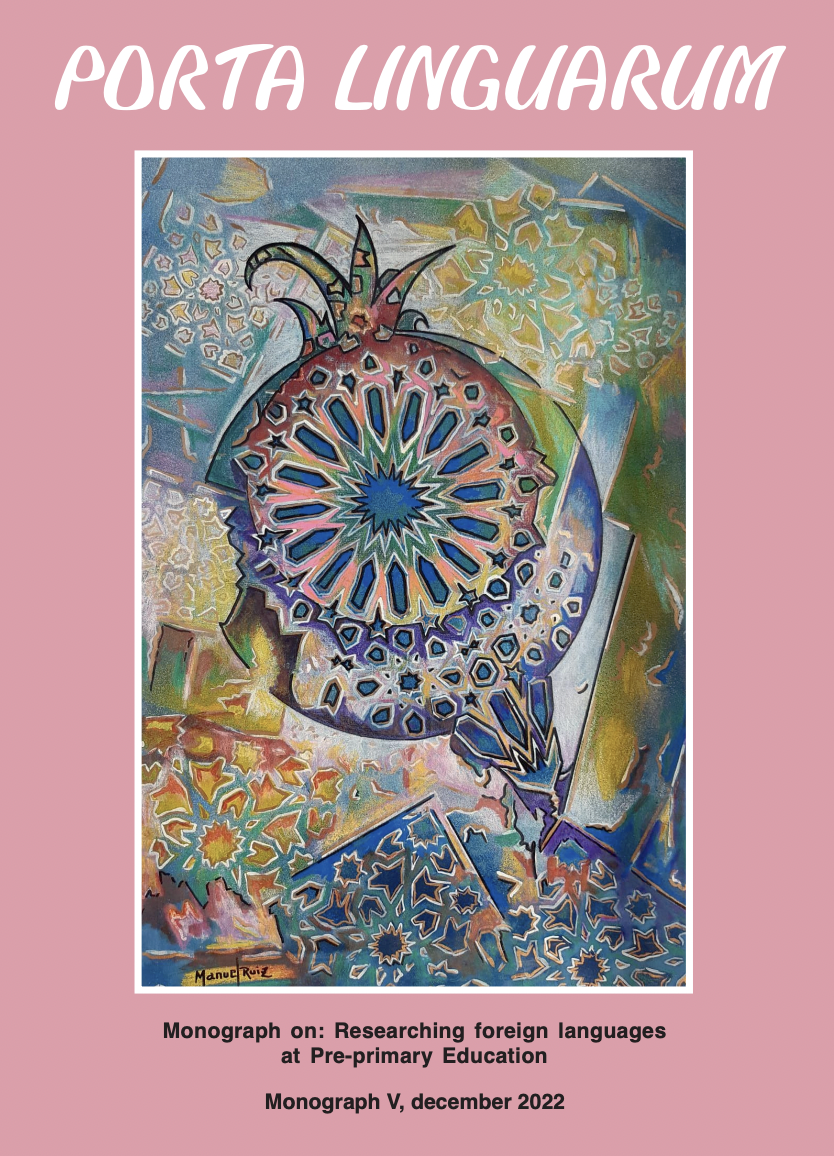Intensive parenting and elective bilingualism English/Spanish in Spanish monolingual families: From language ideologies to practice
DOI:
https://doi.org/10.30827/portalin.vi.26273Keywords:
elective bilingualism, family language policy,, good-parenting, language socialization,, linguistic entrepreneurshipAbstract
In our globalised economy, English proficiency is currently a priority for Spanish families, as it is fundamental for ensuring their children’s future economic and personal welfare. As a sign of good parenting, families are increasingly acting as linguistic entrepreneurs and adopting family language policies oriented to provide their children with the best methodologies to enhance English learning, thereby investing their personal and financial capital in extracurricular classes, local English camps, and stays abroad. In searching for more natural learning environments, those parents with knowledge of English emulate native bi/multilingual families and raise their children in English and Spanish. This type of non-native elective bilingualism upbringing is gaining momentum in Spain and deserves further scrutiny. Therefore, this paper is devoted to better understand this phenomenon by means of the study of 16 Spanish families who are raising their children in English and Spanish. Their family language policy (FLP) will be analysed in terms of language beliefs, language management and language practices. Results reflect parents’ desires and imagined identities with English as a metaphor of accomplishment, as well as their emotional implications, disruptions and negotiations to bring to fruition this complex socialization practice.
Downloads
References
Alarcón, A., & Nieto Moreno de Diezmas, E. (in press). Speaking in nobody’s mother tongue: English immersion at home as a Family Language Policy. Ampersand.
Baker, S. T., Le Courtois, S., & Eberhart, J. (2021). Making space for children’s agency with playful learning. International Journal of Early Years Education https://doi.org/10.1080/09669760.2021.1997726
Barron-Hauwaert, S. (2010). Bilingual Siblings: Language Use in Families (Parents’ and Teachers’ Guides). Bristol, UK: Multilingual Matters.
Council of Europe. (2001, 2018). Common European framework of reference for languages: learning, teaching, assessment. Cambridge: Cambridge University Press.
Council of Europe. (2021). Common European Framework of Reference for Languages: Learning, Teaching, Assessment. Strasbourg: Council of Europe Publishing.
Darvin, R., & Norton, B. (2017). Language, Identity, and Investment in the Twenty-first Century. In Language Policy and Political Issues in Education, Encyclopedia of Language and Education. Springer International Publishing. https://doi.org/10.1007/978-3-319-02320-5_18-2
De Costa, P., Park, J., & Wee, L. (2016). Language Learning as Linguistic Entrepreneurship: Implications for Language Education. The Asia-Pacific Education Researcher, 25, 695-702. https://doi.org/10.1007/s40299-016-0302-5
De Costa, P., Park, S.Y., & Wee, L. (2021) Why linguistic entrepreneurship? Multilingua, 40(2), 139–153
García Armayor, O. (2019). The possibilities of elective bilingualism in BFLA: raising bilingual children in monolingual contexts. Estudios de Lingüística Aplicada, Mon I, 235-296. https://doi.org/10.12795/elia.mon.2019.i1.11
Holloway, S., & Pimlott-Wilsom, H. (2014). Any Advice is Welcome Isn’t it?”: Neoliberal Parenting Education, Local Mothering Cultures, and Social Class. Environment and Planning A: Economy and Space, 46(1), 94-111. https://doi.org/10.1068/a45457
Hurajová, A. (2020). The Phenomenon of Bilingualism in Slovakia: Raising a Bilingual in a Monolingual Culture- A Family Case Study on Intentional Bilingualism as a Communication Strategy. Research Anthology on Bilingual and Multilingual Education, (1049-1068). IGI Global.
https://doi.org/10.4018/978-1-6684-3690-5.ch052
Kielhöfer, B., & Jonekeit, S. (1983). Zweisprachige Kindererziehung/ Bilingual Upbringing of Children.Tübingen, Germany: Stauffenburg-Verlag.
King, K., Fogle, L., & Logan-Terry, A. (2008). Family Language Policy. Linguistic and Language Compass, 2(5), 907-922. https://doi.org/10.1111/j.1749-818X.2008.00076.x
Krashen, S. (2006). English Fever. Crane Publishing Co.
López, V., Madrid, R., & Sisto, V. (2012). “Red Light” in Chile: Parents Participating as Consumers of Education Under Global Neoliberal Policies. Globalization- Education and Management Agendas. Intechopen. https://doi.org/10.5772/50305
Marques, M., Feather, N., Austin, D., & Sibley, C. (2022). Attitudes towards favoring the fall of Tall Poppies: The role of Social Dominance Orientation, Authoritarianism, Political Ideologies, and Self-Esteem. The Journal of Social Psychology, 162(5), 640-653. https://doi.org/https://doi.org/10.1080/00224545.2021.1944034
Myers-Scotton, C. (2006). Multiple Voices. An introduction to Bilingualism. Blackwell Publishing Ltd.
Nieto Moreno de Diezmas, E. (2018). The acquisition of L2 listening Comprehension skills in primary and secondary education settings: a comparison between CLIL and non- CLIL student performance. RLA. Revista de Lingüística Teórica y Aplicada, 56(2), 13-34.
Nogueroles López, M., Pérez Serrano, M., & Duñabeitia, J. A. (2022). Hablar con tu(s) hijo/a(s) en lengua extranjera: motivaciones de las familias. ELIA: Estudios De Lingüística Inglesa Aplicada, (2 Monogr.), 139–175. https://revistas.uned.es/index.php/ELIA/article/view/32838
Nyikos, M. (2014). Bilingualism and Family: Parental Beliefs; child agency. Sustainable Multilingualism 5, 18-40. http://dx.doi.org/10.7220/2335-2027.5.1
OECD. (2018). Preparing our Youth for an Inclusive and Sustainable World. The OECD PISA Global Competence Framework. Paris: PISA
Pardo Pérez, J., & García Tobío, A. (2003). Los estragos del neoliberalismo y la Educación Pública. Educatio Siglo XXI, 20, 39-85. https://revistas.um.es/educatio/article/view/134/118
Piller, I., & Cho, J. (2013). Neoliberalism as language policy. Language in Society, 42, 23-44. Cambridge University Press. https://doi.org/10.1017/S0047404512000887
Saunders, G. (1982). Bilingual Children: Guidance for the Family. Clevedon: Multilingual Matters.
Saunders, G. (1988). Bilingual Children: From Birth to Teens. Clevedon, Philadelphia: Multilingual Matters.
Sims, M. (2017). Neoliberalism and early childhood. Cogent Education, 4, 1-10. Taylor & Francis. https://doi.org/10.1080/2331186X.2017.1365411
Spolsky, B. (2009). Language Management. Cambridge University Press.
Szramek-Karcz, S. (2016). The Success of Non-Native Bilingualism in Poland. Lingwistyka Stosowana, 17(2), 93-102. https://doi.org/10.32612/uw.20804814.2016.2.
Valdés, G., & Figueroa, R. (1994). Second language learning. Bilingualism and testing: A special case of bias. Ablex Publishing.
Vincent, C., & Maxwell, C. (2015). Parenting priorities and pressures: furthering understanding of ‘concerted cultivation’. Discourse: Studies in the Cultural Politics of Education, 37(2), 269-281. https://doi.org/10.1080/01596306.2015.1014880
Yerkes, M., Hopman, M., Stok, F., & De Wit, J. (2021). In the best interests of children? The paradox of intensive parenting and children’s health. Critical Public Health, 31(3), 349-360. https://doi.org/10.1080/09581596.2019.1690632



















